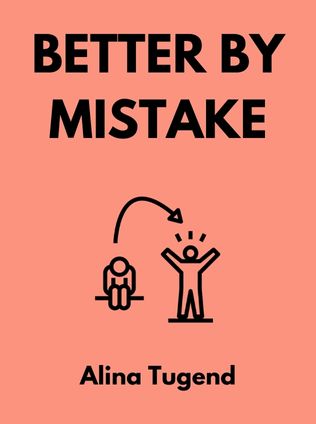
Better By Mistake
The Unexpected Benefits of Being Wrong
By Alina Tugend
Published 04/2012
About the Author
Alina Tugend is an acclaimed journalist with a long history of writing about a range of topics including education, environmentalism, and consumer culture. Her work has been featured in numerous reputable publications such as The Los Angeles Times and The Atlantic. Tugend is also known for her award-winning "ShortCuts" column for The New York Times. With her book, Better by Mistake: The Unexpected Benefits of Being Wrong, Tugend brings her investigative and insightful writing style to explore the multifaceted nature of mistakes and their often unrecognized value.
Main Idea
The central thesis of Better by Mistake is that mistakes, often viewed as failures to be avoided at all costs, are actually valuable opportunities for learning and growth. Tugend argues that our cultural attitudes towards mistakes—seeing them as purely negative and punitive—are fundamentally flawed. Instead, she posits that when we acknowledge and correctly identify mistakes, we can improve ourselves, our work, and our relationships. Through a combination of personal anecdotes, research studies, and real-world examples, Tugend illustrates how embracing mistakes can lead to greater innovation, creativity, and personal development.
Table of Contents
- Introduction
- (Mis)Understanding and (Re)Defining Mistakes
- It Starts Early
- "Fail Often, Fast and Cheap"
- It's Not Brain Surgery... But What If It Is?
- Lessons from the Cockpit
- Blaming You, Blaming Me
- You Say Mistake, I Say Lesson
- I Want to Apologize
- Conclusion
Introduction
Tugend begins her exploration by highlighting the pervasive fear of making mistakes that looms over many of us. This fear not only prevents us from taking risks in our personal and professional lives but also inhibits us from truly accepting our human imperfection. She introduces the idea that mistakes vary in magnitude and consequence, from minor oversights to critical errors with significant repercussions. However, most mistakes we make are not life-threatening, and understanding this can help us approach them with a healthier mindset.
“The fear of making mistakes is a cudgel that hangs over so many of us, preventing us from not only taking risks in our personal and professional lives but even more important, from really accepting — not just giving lip service to — the truth that we all are human and imperfect.” - Alina Tugend
(Mis)Understanding and (Re)Defining Mistakes
In this chapter, Tugend delves into the complex nature of mistakes and how they are perceived. She references the work of British academic Patricia Bryans, who found that mistakes are often defined by misjudgment and adverse consequences that were unplanned. Tugend introduces the concepts of active and latent errors, explaining that while active errors are direct actions that lead to mistakes, latent errors are hidden issues within systems that create the conditions for mistakes.
Sign up for FREE and get access to 1,400+ books summaries.
You May Also Like
The Subtle Art of Not Giving a F*ck
A Counterintuitive Approach to Living a Good Life
By Mark MansonRich Dad Poor Dad
What the Rich Teach Their Kids About Money - That the Poor and Middle Class Do Not!
By Robert T. KiyosakiHow To Win Friends and Influence People
The All-Time Classic Manual Of People Skills
By Dale CarnegieFreakonomics
A Rogue Economist Explores the Hidden Side of Everything
By Steven D. Levitt and Stephen J. Dubner



















